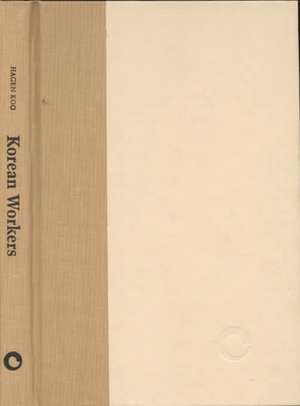Korean Workers – The Culture and Politics of Class Formation
Autor Hagen Kooen Limba Engleză Hardback – 13 noi 2001
Preț: 720.10 lei
Preț vechi: 986.43 lei
-27% Nou
Puncte Express: 1080
Preț estimativ în valută:
137.83€ • 143.35$ • 115.50£
137.83€ • 143.35$ • 115.50£
Carte tipărită la comandă
Livrare economică 14-28 martie
Preluare comenzi: 021 569.72.76
Specificații
ISBN-13: 9780801438356
ISBN-10: 0801438357
Pagini: 256
Ilustrații: 29
Dimensiuni: 152 x 229 x 25 mm
Greutate: 0.52 kg
Ediția:New.
Editura: MB – Cornell University Press
ISBN-10: 0801438357
Pagini: 256
Ilustrații: 29
Dimensiuni: 152 x 229 x 25 mm
Greutate: 0.52 kg
Ediția:New.
Editura: MB – Cornell University Press
Descriere
Forty years of rapid industrialization have transformed millions of South Korean peasants and their sons and daughters into urban factory workers. Hagen Koo explores the experiences of this first generation of industrial workers and describes...
